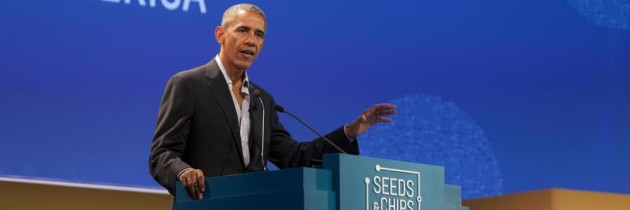Obama Sees New Front in Climate Change Battle: Agriculture
MILAN — Michelle Obama has long been one of the world’s best-known advocates for healthier food production and better eating, but it was her husband who showed up here on Tuesday to talk about climate change and the challenges it presented to feeding the world’s growing population. Former President Barack Obama gave his first speech outside the United States since leaving office at the Seeds & Chips conference, an annual gathering of policy makers, investors and technology entrepreneurs focused on innovations to improve the food chain.
His brief speech was devoted to agriculture’s role in climate change, noting that after energy, agriculture is the second-largest contributor to greenhouse gas emissions. Now, he said, those emissions are starting to take their toll on food production itself. “Our changing climate is already making it more difficult to produce food,” he said. “We’ve already seen shrinking yields and rising food prices.”
He said the costs would be borne most by the poor, noting that many of the refugees seeking sanctuary in Europe are driven not by conflict but by famine.
“When we think about issues like food security or climate change, ultimately politicians can help guide policy, but the energy to bring about change is going to come from what people do every day,” Mr. Obama said. “It’s going to come from parents who are concerned about the impact climate change may have on their child, from business people who say how can we use less energy or waste less resources in making our products. It’s millions of decisions made individually that have the ability to make changes.”
Much of his appearance, which lasted over an hour, at the conference was spent conversing with Sam Kass, who served Mr. Obama’s White House as a senior policy adviser for nutrition and who now invests in and mentors food entrepreneurs.
Mr. Kass asked him about the Paris climate agreement, which Mr. Obama negotiated. President Trump has threatened to withdraw from the 2015 accord, in which nearly 200 countries have agreed to work to lower their greenhouse gas emissions.
Mr. Obama responded with his trademark tutorial in rising ocean waters and temperatures, before addressing the concern that the rest of the world has about the United States’ commitment to the deal.
“Obviously, the current administration has differences with my administration in terms of energy policy, and that’s part of what happens in democracy,” he said. “There will be a useful debate in America, but I think the good news is that, in part because of what we did over the last eight years, the private sector has already made a decision that the future is in clean energy.”
The former president also noted that the Paris agreement focused on damage to the environment from the energy sector, leaving the role of food production largely unaddressed. “We are actually seeing a continuing increase in emissions coming out of the agriculture sector,” he said, “and a lot of that has to do with changing diets around the world.”
He said that even as the developed world works to reduce its consumption of meat, developing nations are eating more meat. “This offers a huge opportunity for entrepreneurs, businesses, scientists and thought leaders to make progress in an area where we have not made as much progress,” he said.
Mr. Obama observed that most people do not think of food as a source of pollution. “Because food is so close to us and is part of our family and is part of what we do every single day, people, I think, are more resistant to the idea of government or bureaucrats telling them what to eat, how to eat and how to grow,” he said.
The powerful agriculture lobby in Washington, he said, can also hinder change. “Historically in the United States, the one area where Democrats and Republicans agree is on the agriculture committees, because the members usually come from agricultural states and they’re very good at joining across party lines to protect the interests of food producers,” Mr. Obama said. “It makes for a difficult political dynamic for us being able to shape rational policy.”
Mr. Kass asked his former boss to speak about the developing field of personalized health and the part food plays in it. Mr. Obama mentioned that his daughter Malia has a peanut allergy and is participating in a Stanford University program that tailors treatment to the individual.
“How that translates into people’s eating habits, we don’t yet know,” he said. “Because a lot of people don’t just eat for health — we eat because it tastes good, too.”
He then brought up the desserts offered at a dinner on Monday night at the Palazzo Clerici, which houses the Italian Institute for International Political Studies. “I can’t say all the desserts that were served were good for me,” he said. “Even if you had told me they weren’t good for me, I still would have eaten them because they were good.”
Mr. Obama recently came under criticism for reportedly accepting a $400,000 fee to speak at a Cantor Fitzgerald health care conference next fall. A spokeswoman for Seeds & Chips would not say what the organization had paid him to speak.
Fonte: The New York Times



